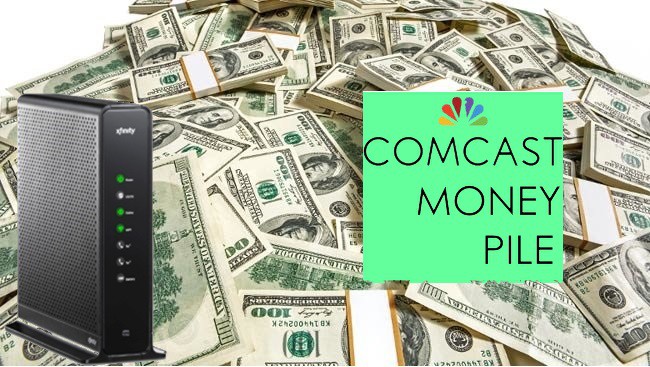 Comcast today quietly announced its broadband customers in Fort Lauderdale, the Keys and Miami, Fla., will find a broadband usage cap of 300GB per month imposed on their Internet access starting Oct. 1, 2015, along with the option of buying a new $30 insurance plan to protect against overlimit fees and restore unlimited access.
Comcast today quietly announced its broadband customers in Fort Lauderdale, the Keys and Miami, Fla., will find a broadband usage cap of 300GB per month imposed on their Internet access starting Oct. 1, 2015, along with the option of buying a new $30 insurance plan to protect against overlimit fees and restore unlimited access.
Stop the Cap! reader Jose from Hialeah informed us Comcast formally began notifying affected customers in e-mail earlier today and updated their website (thanks to DSL Reports):
***An important update about your XFINITY Internet service:
We’re writing to let you know that we will be trialing a new XFINITY Internet data plan in your area. Starting October 1, 2015, your monthly data plan will include 300GB. We’ll also trial a new “Unlimited Data” option that will give you the choice to purchase unlimited data for $30 per month in addition to your monthly Internet service fee.
The majority of XFINITY customers use less than 300GB of data in a month, and therefore will not be affected by these changes. If you are not sure of your monthly data usage, please refer to the Track and Manage Your Usage section below.
Here are the details of the plan:
You’ll get 300GB of data each month. If for any reason you exceed the 300GB included in your plan in a month, we will automatically add blocks of 50GB to your account for an additional fee of $10 each. We’re also implementing a three-month courtesy program. That means you will not be billed for the first three times you exceed the 300GB included in the monthly data plan.
Here are the details of the Unlimited Data option:
If you don’t want a 300GB data plan, the new Unlimited Data option is an alternative that provides additional choice and flexibility, especially for customers who use lots of data. You can choose to enroll in the Unlimited Data option at any time for an additional $30 a month, regardless of how much data you use. Enrollment in this option goes into effect on the first day of the subsequent calendar month.
Notifications:
If you are on the 300 GB plan, we will send you a courtesy “in-browser” notice and an email letting you know when you reach 90%, 100%, 110%, and 125% of your monthly data usage plan amount. You can also elect to receive notifications at additional thresholds as well as set up mobile text notifications. Notices will not be sent to customers who enroll in the unlimited data option.
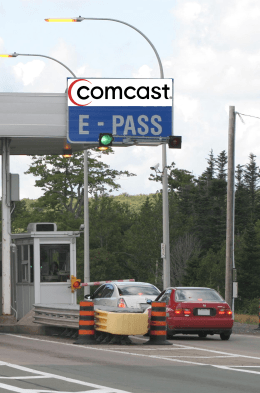
$30 a month will let Floridians bypass Comcast’s overlimit usage tolls.
What is remarkable about the introduction of Comcast’s latest usage cap trial is the naked monetization scheme that accompanies it. Comcast’s old arguments that usage caps provide an even usage experience and fairness for all customers has been replaced with a new $30 insurance plan that effectively restores the unlimited usage plan customers had until this month… for $30 more a month than they used to pay. Once Comcast collects your $30, the sky is the limit as far as usage is concerned.
Customers are howling about the changes on Comcast’s social media platforms and customer support forums. Stop the Cap! strongly urges Comcast customers to also complain to the Federal Communications Commission using this online complaint form. The more Americans that complain about capped Internet, the more likely the FCC will act on the issue.
“Comcast can just do whatever they want without asking or giving notice,” writes Jason. “So basically we all just got a $30 a month increase in our Comcast bill, such BS! I’ve been a Comcast customer over 20 years. I am done. This was the last straw.”
“Kiss my business goodbye,” wrote another customer. “I have had nothing but trouble with Comcast since I’ve had it. Weekly outages, incompetent techs on the phone, etc. AT&T U-verse may not have speeds that are as fast as Comcast, but the service was reliable, and they didn’t try to stab us in the back with ridiculous fees. Hasta la vista, Comcast!”
For now, the Unlimited Data Option is only available to customers in Florida. All other Comcast customers living under the company’s usage caps will continue to face overlimit fees of $10 for each 50GB of usage they run up past their 300GB usage allowance.
Comcast has also suddenly clarified exactly which customers are facing a life with usage caps by publishing a lengthy list of zip codes where unlucky customers will not be allowed to receive unlimited broadband. (Last week, Stop the Cap! shared with readers the story of Comcast customers in Georgia being misled about usage caps by Comcast employees. Woodstock’s two zip codes – 30188 and 30189 – appear on the below list.):
Alabama
35020, 35021, 35023, 35111, 35211, 35401, 35403, 35404, 35405, 35406, 35440, 35444, 35446, 35447, 35453, 35473, 35475, 35476, 35486, 35487, 35490, 35630, 35631, 35632, 35633, 35634, 35645, 35660, 35661, 35674, 35677, 35741, 35748, 35750, 35756, 35758, 35759, 35763, 35773, 35801, 35802, 35803, 35805, 35806, 35810, 35811, 35816, 35824, 35899, 35901, 35903, 35904, 35905, 35906, 35907, 35952, 35953, 35954, 35961, 35972, 35987, 36528, 36571, 36572, 36575, 36582, 36587, 36602, 36603, 36604, 36605, 36606, 36607, 36608, 36609, 36610, 36611, 36612, 36613, 36615, 36617, 36618, 36619, 36652, 36693, 36695
Arizona
85145, 85619, 85653, 85658, 85704, 85705, 85709, 85712, 85713, 85715, 85718, 85719, 85735, 85737, 85739, 85741, 85742, 85743, 85745, 85746, 85749, 85750, 85755, 85757
Arkansas
72301, 72303, 72331, 72364, 72373
Florida – New Area for 300GB Usage Cap; Unlimited Data Option available for $30 extra per month.
33001, 33004, 33009, 33010, 33012, 33013, 33014, 33015, 33016, 33018, 33019, 33020, 33021, 33023, 33024, 33025, 33026, 33027, 33028, 33029, 33030, 33031, 33032, 33033, 33034, 33035, 33036, 33037, 33040, 33042, 33043, 33044, 33045, 33050, 33051, 33054, 33055, 33056, 33060, 33062, 33063, 33064, 33065, 33066, 33067, 33068, 33069, 33070, 33071, 33073, 33076, 33109, 33122, 33125, 33126, 33127, 33128, 33129, 33130, 33131, 33132, 33133, 33134, 33135, 33136, 33137, 33138, 33139, 33140, 33141, 33142, 33143, 33144, 33145, 33146, 33147, 33149, 33150, 33155, 33156, 33157, 33158, 33160, 33161, 33162, 33165, 33166, 33167, 33168, 33169, 33170, 33172, 33173, 33174, 33175, 33176, 33177, 33178, 33179, 33180, 33181, 33182, 33183, 33184, 33185, 33186, 33187, 33189, 33190, 33193, 33194, 33196, 33199, 33233, 33242, 33301, 33304, 33305, 33306, 33308, 33309, 33310, 33311, 33312, 33313, 33314, 33315, 33316, 33317, 33319, 33321, 33322, 33323, 33324, 33325, 33326, 33327, 33328, 33330, 33331, 33332, 33334, 33337, 33351, 33355, 33388, 33394, 33434, 33441, 33442, 34142, 34974
Georgia
30002, 30004, 30005, 30008, 30009, 30011, 30012, 30013, 30014, 30016, 30017, 30018, 30019, 30021, 30022, 30024, 30025, 30028, 30030, 30032, 30033, 30034, 30035, 30038, 30039, 30040, 30041, 30043, 30044, 30045, 30046, 30047, 30052, 30054, 30055, 30056, 30058, 30060, 30062, 30064, 30066, 30067, 30068, 30069, 30071, 30072, 30075, 30076, 30078, 30079, 30080, 30082, 30083, 30084, 30087, 30088, 30090, 30092, 30093, 30094, 30096, 30097, 30098, 30101, 30102, 30103, 30104, 30105, 30106, 30107, 30108, 30109, 30110, 30111, 30114, 30115, 30116, 30117, 30120, 30121, 30122, 30123, 30125, 30126, 30127, 30132, 30134, 30135, 30137, 30139, 30141, 30142, 30144, 30145, 30146, 30147, 30149, 30150, 30152, 30153, 30157, 30161, 30165, 30168, 30171, 30172, 30173, 30176, 30178, 30179, 30180, 30182, 30183, 30184, 30185, 30187, 30188, 30189, 30205, 30213, 30214, 30215, 30220, 30223, 30224, 30228, 30230, 30236, 30238, 30248, 30250, 30252, 30253, 30257, 30260, 30263, 30265, 30266, 30268, 30269, 30272, 30273, 30274, 30276, 30277, 30281, 30288, 30290, 30291, 30292, 30294, 30296, 30297, 30303, 30304, 30305, 30306, 30307, 30308, 30309, 30310, 30311, 30312, 30313, 30314, 30315, 30316, 30317, 30318, 30319, 30320, 30322, 30324, 30326, 30327, 30328, 30329, 30330, 30331, 30332, 30334, 30336, 30337, 30338, 30339, 30340, 30341, 30342, 30344, 30345, 30346, 30349, 30350, 30354, 30358, 30359, 30360, 30361, 30363, 30369, 30410, 30411, 30413, 30414, 30417, 30423, 30427, 30428, 30429, 30434, 30439, 30442, 30445, 30457, 30467, 30471, 30477, 30501, 30504, 30506, 30507, 30517, 30518, 30519, 30520, 30527, 30529, 30530, 30533, 30534, 30542, 30543, 30548, 30549, 30554, 30558, 30564, 30567, 30575, 30606, 30607, 30620, 30622, 30624, 30634, 30635, 30643, 30655, 30656, 30666, 30673, 30677, 30680, 30701, 30733, 30735, 30746, 30802, 30805, 30807, 30808, 30809, 30812, 30813, 30814, 30815, 30816, 30817, 30824, 30828, 30830, 30901, 30904, 30905, 30906, 30907, 30909, 30912, 30914, 31002, 31063, 31064, 31068, 31096, 31301, 31302, 31304, 31305, 31307, 31308, 31309, 31312, 31313, 31314, 31315, 31316, 31318, 31320, 31321, 31322, 31323, 31324, 31326, 31328, 31329, 31331, 31333, 31401, 31404, 31405, 31406, 31407, 31408, 31409, 31410, 31411, 31415, 31419, 31421, 31543, 31545, 31546, 31555, 31560, 31566, 31568, 31569
Illinois
62910, 62960
Indiana
47520, 47586
Kentucky
40150, 40160, 40162, 40175, 42001, 42002, 42003, 42027, 42029, 42048, 42053, 42058, 42069, 42082, 42086, 42127, 42134, 42141, 42152, 42223, 42321, 42323, 42324, 42326, 42330, 42332, 42337, 42344, 42345, 42367, 42374, 42701, 42702, 42712, 42716, 42718, 42724, 42726, 42732, 42733, 42740, 42748, 42749, 42754, 42757, 42758, 42764, 42783, 42788
Louisiana
71201, 71202, 71203, 71209, 71225, 71227, 71229, 71234, 71238, 71280, 71291, 71292, 71294
Maine
03901, 03903, 03904, 03905, 03908, 04003, 04008, 04011, 04032, 04066, 04078, 04079, 04086, 04222, 04287, 04530, 04562, 04565, 04579
Mississippi
38611, 38618, 38619, 38621, 38632, 38635, 38637, 38641, 38649, 38651, 38654, 38661, 38664, 38666, 38668, 38670, 38671, 38672, 38674, 38676, 38680, 38683, 38801, 38802, 38803, 38804, 38824, 38826, 38828, 38829, 38834, 38835, 38843, 38846, 38849, 38855, 38856, 38857, 38860, 38862, 38866, 38868, 38869, 38876, 38879, 39041, 39042, 39043, 39046, 39047, 39056, 39066, 39071, 39073, 39079, 39110, 39145, 39151, 39154, 39157, 39167, 39170, 39174, 39175, 39193, 39201, 39202, 39203, 39204, 39206, 39208, 39209, 39210, 39211, 39212, 39213, 39216, 39217, 39218, 39232, 39269, 39272, 39301, 39302, 39303, 39304, 39305, 39307, 39309, 39320, 39325, 39335, 39338, 39342, 39347, 39348, 39355, 39364, 39366, 39367, 39401, 39402, 39406, 39422, 39437, 39439, 39440, 39441, 39442, 39443, 39455, 39465, 39475, 39477, 39481, 39773
South Carolina
29108, 29127, 29401, 29403, 29404, 29405, 29406, 29407, 29408, 29409, 29410, 29412, 29414, 29418, 29420, 29424, 29425, 29426, 29429, 29438, 29439, 29445, 29449, 29451, 29455, 29456, 29461, 29464, 29466, 29470, 29482, 29483, 29485, 29487, 29488, 29492, 29628, 29803, 29822, 29829, 29831, 29841, 29842, 29847, 29860, 29901, 29902, 29904, 29906, 29907, 29911, 29920, 29924, 29944, 29945
Tennessee
37010, 37013, 37014, 37015, 37020, 37022, 37025, 37026, 37027, 37029, 37030, 37031, 37032, 37033, 37036, 37037, 37042, 37046, 37048, 37049, 37051, 37055, 37059, 37060, 37062, 37064, 37066, 37067, 37069, 37071, 37072, 37073, 37074, 37075, 37076, 37080, 37082, 37083, 37085, 37086, 37087, 37090, 37098, 37115, 37119, 37122, 37127, 37128, 37129, 37130, 37131, 37132, 37135, 37137, 37138, 37141, 37143, 37145, 37148, 37149, 37150, 37152, 37153, 37165, 37166, 37167, 37172, 37179, 37181, 37185, 37186, 37187, 37188, 37189, 37190, 37201, 37203, 37204, 37205, 37206, 37207, 37208, 37209, 37210, 37211, 37212, 37213, 37214, 37215, 37216, 37217, 37218, 37219, 37220, 37221, 37228, 37229, 37232, 37235, 37236, 37238, 37240, 37243, 37246, 37306, 37318, 37324, 37330, 37352, 37366, 37398, 37701, 37705, 37709, 37710, 37713, 37714, 37716, 37719, 37721, 37722, 37725, 37726, 37737, 37738, 37742, 37748, 37754, 37755, 37756, 37757, 37763, 37764, 37766, 37769, 37770, 37771, 37772, 37777, 37779, 37801, 37803, 37804, 37806, 37807, 37820, 37821, 37828, 37829, 37830, 37840, 37841, 37843, 37845, 37847, 37849, 37852, 37853, 37854, 37862, 37863, 37871, 37872, 37876, 37882, 37886, 37887, 37892, 37902, 37909, 37912, 37914, 37915, 37916, 37917, 37918, 37919, 37920, 37921, 37922, 37923, 37924, 37929, 37931, 37932, 37934, 37938, 37996, 37998, 38002, 38010, 38011, 38014, 38015, 38016, 38017, 38018, 38019, 38028, 38029, 38036, 38039, 38046, 38048, 38049, 38052, 38057, 38060, 38061, 38066, 38067, 38068, 38069, 38075, 38076, 38103, 38104, 38105, 38106, 38107, 38108, 38109, 38111, 38112, 38113, 38114, 38115, 38116, 38117, 38118, 38119, 38120, 38122, 38125, 38126, 38127, 38128, 38131, 38132, 38133, 38134, 38135, 38137, 38138, 38139, 38141, 38152, 38157, 38305, 38326, 38339, 38357, 38365, 38367, 38375, 38504, 38547, 38549, 38553, 38555, 38556, 38557, 38558, 38560, 38565, 38570, 38571, 38572, 38577, 38583

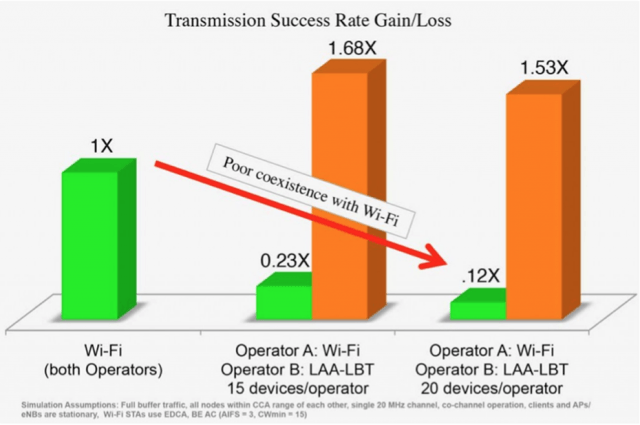 Critics contend the wireless industry’s proposed service is not as likely to use “Listen Before Talk” effectively, a standard that checks for existing traffic before powering up on an unlicensed frequency. Consumer groups fear mobile carriers will have both the ability and a strong incentive to use LTE-U and LAA to charge consumers for the use of unlicensed spectrum and give themselves an unfair advantage by escaping the interference its own technology can cause other users.
Critics contend the wireless industry’s proposed service is not as likely to use “Listen Before Talk” effectively, a standard that checks for existing traffic before powering up on an unlicensed frequency. Consumer groups fear mobile carriers will have both the ability and a strong incentive to use LTE-U and LAA to charge consumers for the use of unlicensed spectrum and give themselves an unfair advantage by escaping the interference its own technology can cause other users.

 Subscribe
Subscribe Less than three months before announcing it would acquire Time Warner Cable in a $55 billion deal, Charter Communications quietly dropped usage caps, in place on its broadband plans since 2009, without explanation and the FCC wants to know why.
Less than three months before announcing it would acquire Time Warner Cable in a $55 billion deal, Charter Communications quietly dropped usage caps, in place on its broadband plans since 2009, without explanation and the FCC wants to know why.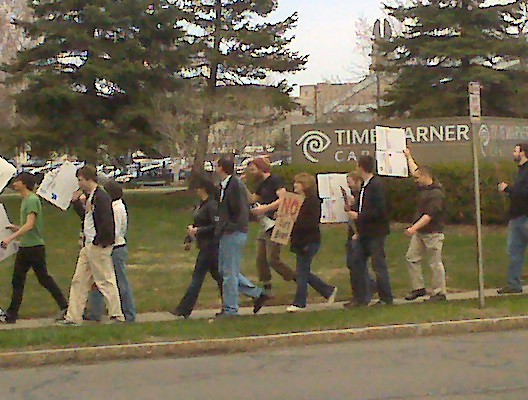
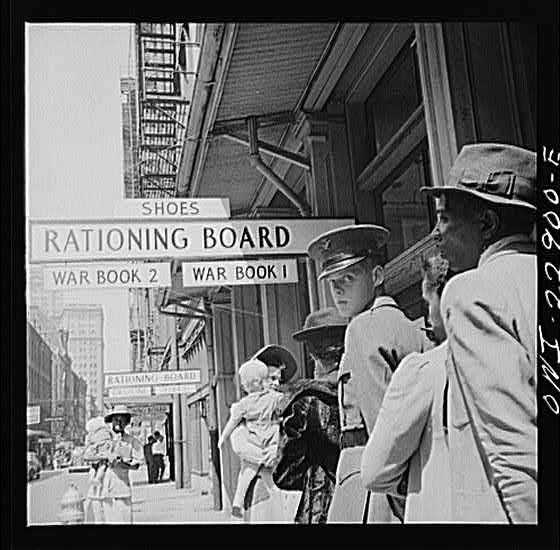
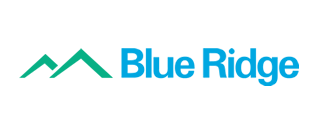 A tiny cable company serving communities around the Blue Mountain in eastern Pennsylvania has a big appetite for rationing Internet usage by imposing data caps and overlimit fees on their 170,000 customers.
A tiny cable company serving communities around the Blue Mountain in eastern Pennsylvania has a big appetite for rationing Internet usage by imposing data caps and overlimit fees on their 170,000 customers.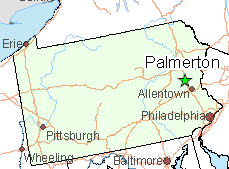

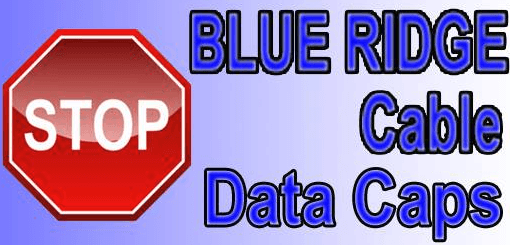
 Comcast today quietly announced its broadband customers in Fort Lauderdale, the Keys and Miami, Fla., will find a broadband usage cap of 300GB per month imposed on their Internet access starting Oct. 1, 2015, along with the option of buying a new $30 insurance plan to protect against overlimit fees and restore unlimited access.
Comcast today quietly announced its broadband customers in Fort Lauderdale, the Keys and Miami, Fla., will find a broadband usage cap of 300GB per month imposed on their Internet access starting Oct. 1, 2015, along with the option of buying a new $30 insurance plan to protect against overlimit fees and restore unlimited access.


